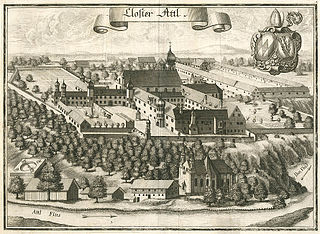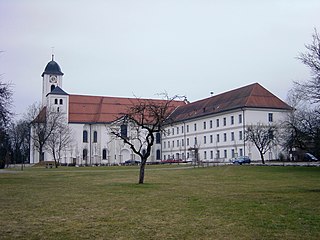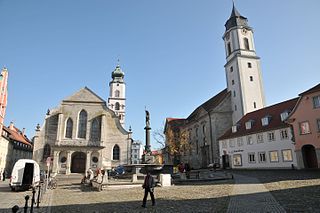This article relies largely or entirely on a single source .(September 2022) |
Reichenbach Abbey is a monastery of the Brothers Hospitallers, formerly a Benedictine monastery, in Reichenbach in Bavaria, Germany.
Contents

This article relies largely or entirely on a single source .(September 2022) |
Reichenbach Abbey is a monastery of the Brothers Hospitallers, formerly a Benedictine monastery, in Reichenbach in Bavaria, Germany.

The monastery, dedicated to the Assumption of the Blessed Virgin, was founded in 1118 by Markgraf Diepold III of Vohburg and his mother Luitgard. During the Reformation it was looted, and secularised from 1553 to 1669, when it was re-established. It was dissolved again in 1803 during the secularisation of Bavaria. The abbey's property was confiscated by the state and eventually auctioned off in 1820.
After a couple of unsuccessful attempts to restore it as a religious house, the site was acquired in 1890 by the Brothers Hospitallers, who established a nursing home for the mentally and physically handicapped. [1] Today there is in addition a special school teaching therapeutic care.

Ensdorf Abbey was a Benedictine monastery located at Ensdorf in Bavaria, Germany. Dedicated to Saint James, the monastery was founded in 1121 by Pfalzgraf Otto of Wittelsbach. It was dissolved in 1556 but restored in 1669, only to be dissolved again in 1802 in the secularisation of the period.

Frauenzell Abbey was a Benedictine monastery situated in Frauenzell, which is part of Brennberg in Bavaria, Germany.

Scheyern Abbey, formerly also Scheyern Priory, is a house of the Benedictine Order in Scheyern in Bavaria.

Vornbach Abbey was a Benedictine monastery in Neuhaus am Inn in Bavaria, Germany.

Altomünster Abbey was a monastery in the small Bavarian market town of Altomünster.

Plankstetten Abbey is a monastery of the Benedictines located between Berching and Beilngries in Bavaria, Germany. It is a member of the Bavarian Congregation of the Benedictine Confederation.

Michelfeld Abbey was a Benedictine monastery in Auerbach in der Oberpfalz in Bavaria, Germany.

Prüfening Abbey was a Benedictine monastery on the outskirts of Regensburg in Bavaria, Germany. Since the beginning of the 19th century it has also been known as Prüfening Castle. Notably, its extant dedicatory inscription, commemorating the founding of the abbey in 1119, was created by printing and is a unique document of medieval typography.

Attel Abbey, also Attl Abbey, was a Benedictine monastery, later a home for the disabled run by the Brothers Hospitallers, in the village of Attel near Wasserburg am Inn in Bavaria, Germany.

Rott Abbey was a Benedictine monastery in Rott am Inn in Bavaria, Germany.

Weissenohe Abbey was a Benedictine monastery in Weissenohe in the district of Forchheim in Bavaria, Germany.

Weihenstephan Abbey was a Benedictine monastery in Weihenstephan, now part of the district of Freising, in Bavaria, Germany. Brauerei Weihenstephan, located at the monastery site since at least 1040, is said to be the world's oldest continuously operating brewery.
St. Stephen's Abbey, Augsburg is a Benedictine monastery, formerly a house of Augustinian canonesses, in Augsburg in Bavaria, Germany.
Münsterschwarzach Abbey, is a monastery for Benedictine monks in Germany. It is located in Schwarzach am Main, a small market town at the confluence of the rivers Schwarzach and Main in north-eastern Bavaria.

Isen Abbey was a Benedictine abbey, later a collegiate foundation, at Isen in Bavaria, Germany.

Banz Abbey, now known as Banz Castle, is a former Benedictine monastery, since 1978 a part of the town of Bad Staffelstein north of Bamberg, Bavaria, southern Germany.

Fürstenfeld Abbey is a former Cistercian monastery in Fürstenfeldbruck, Bavaria, Germany.
Ursberg Abbey is a former Premonstratensian monastery, now a convent of the Franciscan St. Joseph's Congregation, situated in the small village of Ursberg in the district of Günzburg, Bavaria.

Lindau Abbey was a house of secular canonesses in Lindau on the Bodensee in Bavaria, Germany, which stands on an island in the lake.

Prüll Charterhouse, previously Prüll Abbey, is a former Carthusian monastery, or charterhouse, in Regensburg in Bavaria, Germany.
49°10′58″N12°20′54″E / 49.18278°N 12.34833°E